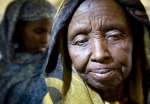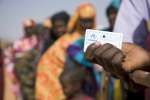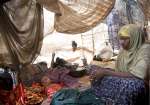- Text size
 |
|  |
|  |
| 
- عربي
UNHCR launches global safe energy strategy to benefit millions
News Stories, 13 May 2014
GENEVA, May 13 (UNHCR) – The UN refugee agency on Tuesday formally launched a global strategy to enable millions of uprooted people to have regular and reliable access to fuel and energy without threat to their lives or well-being.
With an initial focus on energy needs in camp situations, notably for cooking and lighting at night, the SAFE (Safe Access to Fuel and Energy) strategy will provide a cross-sectoral approach to energy planning.
"Safe access to fuel and energy stands at the intersection of so many things that are of concern to UNHCR – from protection, to nutrition, to health, to the environment, to livelihoods to education," Steven Corliss, director of the UNHCR Division of Programme Support and Management, said at a presentation in Geneva with key partners, the UN Foundation and the Global Alliance for Clean Cookstoves.
"Fuel and energy is a basic need, like food, water, shelter, health care, education, but it's not a need that's fully captured in our programmes," he noted, adding: "We're trying to affect a fundamental change in the way UNHCR thinks and programmes for fuel and energy, but we can't do that overnight."
Because of the cost implications of supplying fuel and access to all refugees, he said, UNHCR's approach had to be progressive. "We're going to start by focusing on refugee camps in 10 priority countries [Bangladesh, Burkina Faso, Chad, Ethiopia, Jordan, Kenya, Nepal, Rwanda, Sudan and Uganda] – five in 2014 and five in 2015.
In the first two years, the strategy will provide some 175,000 refugees with stoves and another 150,000 with solar-powered lanterns. In addition, 2,000 solar-powered street lights will be installed in households and communal areas.
"We are looking to improve lighting for security in refugee camps, so people can move around safely at night. At present when it's dark and a woman wants to go to the latrine, which may not be located next to her house, she puts herself at risk," Corliss said. Solar-powered lanterns also allow children to study after nightfall, improving their exam results.
The UN refugee agency will shape SAFE strategies for these pilot countries based on evidence and "very hard-headed assessments to establish the baseline situation and indicators that will allow us to monitor and measure the progress we are making. If we show results, then then we'll have a convincing case for changing the way we do business."
Corliss said cooperation with partners would be vital. UN Foundation board members, including Chief Executive Officer Kathy Calvin, founder, Ted Turner, and Nobel Peace Prize winner Muhammad Yunus, attended Tuesday's presentation along with senior Global Alliance for Clean Cookstoves executives.
"We cannot do it all alone. But fortunately, because domestic energy lies at the intersection of so many areas of concern … there is a tremendous amount of interest in this strategy, not just internally and not just from the humanitarian world, but also from the private sector and foundations and donor governments who believe this is extremely important," he stressed.
Radha Muthiah, executive director of the Global Alliance for Clean Cookstoves, said in a statement that it would work closely with UNHCR to ensuring that the cooking and lighting energy needs of refugees and other vulnerable populations were met, and that these families have a better chance to lead productive, healthy lives. "We are committed to being a catalyst for energy technology innovation, public-private collaboration, and culturally-appropriate solutions for better energy access."
Safe Access to Fuel and Energy (SAFE) is a global inter-agency initiative focused on supporting sustainable and safe access to appropriate energy for cooking, lighting and powering for affected populations in humanitarian contexts.
The collection, supply, and use of biomass fuel, mainly firewood and charcoal, in emergencies create myriads of risks for crisis-affected people and their environment. These risks also occur in protracted situations where displaced people rely on biomass fuel to cook their meals or for light and heat at night. Such risks include sexual and gender-based violence or assault during firewood collection, loss of livelihood and education opportunities, environmental degradation, and respiratory illnesses caused by household air pollution.
























































